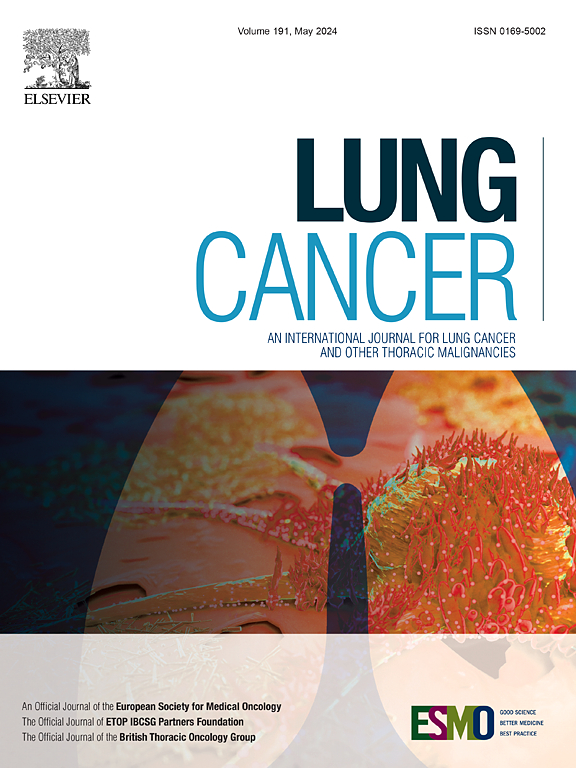FHND-9041在egfr突变晚期非小细胞肺癌患者中的临床I/II期综合研究
IF 4.4
2区 医学
Q1 ONCOLOGY
引用次数: 0
摘要
fhnd -9041是一种新的第三代EGFR酪氨酸激酶抑制剂(EGFR- tki)。这项首次人体研究是一项单臂、多中心、开放标签、非随机Ⅰ/II期试验,旨在评估FHND-9041在egfr突变的非小细胞肺癌(NSCLC)患者中的耐受性、安全性、药代动力学和抗肿瘤活性。该I期研究纳入了87例既往治疗过的EGFR t790m阳性NSCLC患者。剂量递增研究在40mg /天、80mg /天、120mg /天和180mg /天剂量下进行,80mg /天和120mg /天剂量组分别增加了36例和39例患者,以评估安全性和药代动力学。以80mg QD作为推荐的II期剂量,该II期研究评估了FHND-9041作为一线治疗在37例首次治疗患者中的疗效和安全性。结果未观察到剂量限制性毒性,在40 ~ 180 mg剂量范围内未发现最大耐受剂量。药代动力学数据表明剂量比例暴露可达120mg,在120mg时达到平台期。II期研究显示客观缓解率为62.2%(23/37可评估患者),中位无进展生存期为15.5个月(95% CI, 12.9−18.1)。最常见的不良事件是白细胞计数下降(22.6%)和腹泻(21.8%)。治疗相关的3/4级不良事件包括白细胞计数下降(11.3%)和肝损害(4.8%)。结论sfhnd -9041具有良好的安全性和有效性,支持其进一步临床开发用于egfr突变的晚期NSCLC。本文章由计算机程序翻译,如有差异,请以英文原文为准。
Comprehensive first-in-human phase I/II study of FHND-9041 in patients with EGFR-mutated advanced non-small cell lung cancer
Introduction
FHND-9041 is a novel third-generation EGFR tyrosine kinase inhibitor (EGFR-TKI). This first-in-human study is a single-arm, multi-center, open-label, non-randomized phase Ⅰ/II trial that aims to evaluate the tolerability, safety, pharmacokinetics, and anti-tumor activity of FHND-9041 in patients with EGFR-mutated non-small cell lung cancer (NSCLC).
Methods
The phase I study enrolled 87 patients with previously-treated EGFR T790M-positive NSCLC. The dose escalation study was conducted at doses of 40, 80, 120, and 180 mg/day, with an expansion of 36 and 39 patients in the 80 mg and 120 mg dose groups, respectively, to evaluate safety and pharmacokinetics. With 80 mg QD as the recommended phase II dose, the phase II study assessed the efficacy and safety of FHND-9041 as first-line treatment in 37 treatment-naive patients.
Results
No dose-limiting toxicity was observed, and the maximum tolerated dose was not identified within the 40 − 180 mg dose range. Pharmacokinetic data indicated dose-proportional exposure up to 120 mg, with a plateau at 120 mg. The phase II study revealed an objective response rate of 62.2 % (23/37 evaluable patients) with a median progression-free survival of 15.5 months (95 % CI, 12.9 − 18.1). The most common adverse events were decreased white blood cell count (22.6 %) and diarrhea (21.8 %). Treatment-related grade 3/4 adverse events included decreased white blood cell count (11.3 %) and liver impairment (4.8 %).
Conclusions
FHND-9041 exhibits favorable safety and efficacy profile, supporting its further clinical development for EGFR-mutated advanced NSCLC.
求助全文
通过发布文献求助,成功后即可免费获取论文全文。
去求助
来源期刊

Lung Cancer
医学-呼吸系统
CiteScore
9.40
自引率
3.80%
发文量
407
审稿时长
25 days
期刊介绍:
Lung Cancer is an international publication covering the clinical, translational and basic science of malignancies of the lung and chest region.Original research articles, early reports, review articles, editorials and correspondence covering the prevention, epidemiology and etiology, basic biology, pathology, clinical assessment, surgery, chemotherapy, radiotherapy, combined treatment modalities, other treatment modalities and outcomes of lung cancer are welcome.
 求助内容:
求助内容: 应助结果提醒方式:
应助结果提醒方式:


